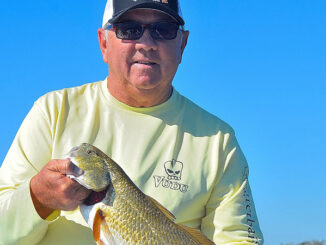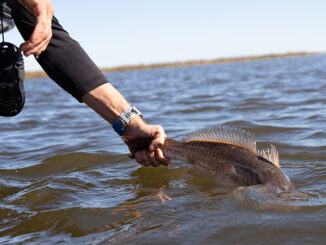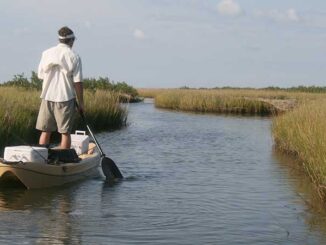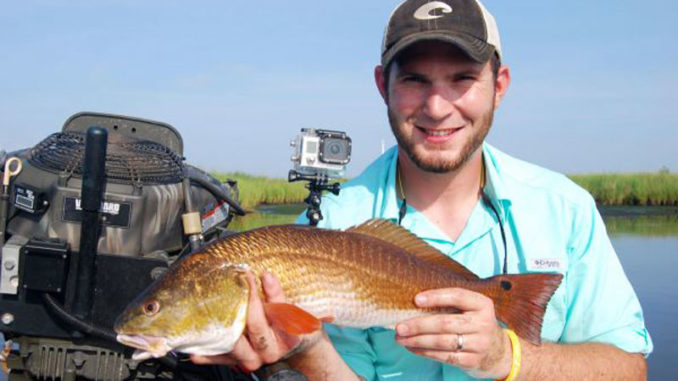
Think it takes all day to catch a limit of redfish? This angler disproves that by regularly catching his fish before his workday begins. Here’s his approach.
Hunter Marcel is the sportsman’s version of the old U.S. Army recruitment ad from the early 1980s: The 23-year-old Houma native does more before 9 a.m. than most people do all day.
In an effort to free up his weekends to spend more time with his growing family, the safety coordinator at Benoit Premium Threading came up with the idea of fishing during the week before heading to his daily job.
The “Before-Work Redfish Challenge” was born, and to make things even more interesting, he added his love for social media and video production into the mix and records each outing on his GoPro Hero3 Black Edition camera.
“Everybody’s got fish tale stories,” Marcel said. “I can say that I caught this many fish or this big of a fish or talk about the big one that got away, and nobody believes you.
“My buddies think that I’m always telling stories, so I decided I would video it and show them exactly how the day went: the good, the bad and the ugly.”
His edited videos of the scenic marshes and ponds around Dulac, which feature amazing sunrises, non-stop casting and lots of glistening redfish, have been seen by thousands on YouTube, as well as on the LouisianaSportsman.com forum.
His mission
The challenge Marcel created is pretty straightforward: Catch his daily limit of five redfish, and arrive at his office on time and ready for work at 8:30 a.m.
On a recent challenge trip out of the Dulac Marina Boat Landing, Marcel mounted the GoPro on the back of his 17-foot Pro Drive rig at almost 6 a.m. before heading out on a brief ride to the marshes and ponds surrounding Lake Quitman.

“The advantage of the GoPro is I can go by myself. I learned how to use it, and I know the timing of the battery and the memory,” he said. “I put it on the back of the boat, make sure the angle is perfect and just start fishing. Every time I catch a fish, I go back there and show the fish off and then get after it again.”
As the sun rose, the water in the marsh was smooth as glass. But the surface of the first pond was a frenzy of activity, with mullet, shrimp and baitfish jumping in all directions. Redfish swirled and showed their tails and dorsal fins, occasionally exploding along a bank.
Marcel steadily worked the trolling motor, constantly scanning for redfish activity. As the boat moved across the pond, he targeted individual fish with each cast and spotted the wake of a swimming reds amongst all the other surface activity with uncanny precision.
What he uses
Compounding the five-fish time challenge is the fact that he never fishes with live or dead shrimp.
“Throwing a shrimp on the bottom is like shooting a deer with a rifle,” he said. “But sight-fishing is like having that bow in your hand in the deer stand.”
He uses strictly artificial baits, typically a gold spoon or a Bayou Chub Cajun pepper on a Rockport Rattler jighead. He uses 12-pound Sufix Elite camo line with a medium-heavy USA Custom rod and a Shimano Calcutta 200 GTB reel.
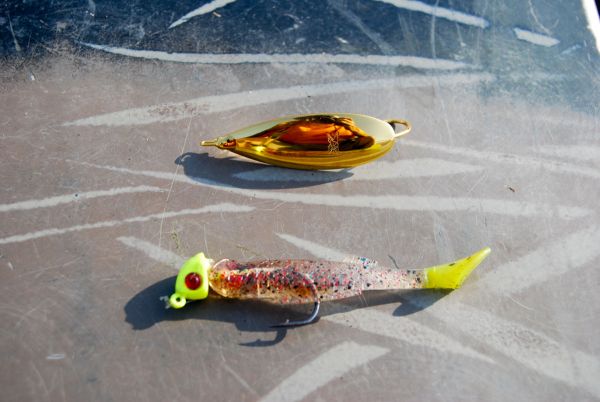
Marcel was constantly in motion on the bow, scanning, casting, retrieving and recasting at individual fish that he’d either seen with their tails exposed or sighted from the semi-circular wake they created as they moved about the ponds.
Since he targets individual fish with each cast, accuracy is vital.
“I try to cast in about a 12-inch window, but I can’t always tell which way the fish is heading,” he said. “I have to figure out where his head is and put the bait across his field of vision.”
Presentation
Depending on the tide, water quality and fish activity on a particular day, he adjusts his presentation accordingly.
“Some days they’re spooking; some days they just want to eat,” he said. “I might bounce it once and reel, or bounce it two or three times and reel. If the water is murky, I might try the gold spoon to get that flash.”
He rarely blind casts because of his limited time on the water, preferring instead to target specific fish each and every time.
“It really is a challenge. Most people say redfishing is easy. If you throw a shrimp on the bottom — of course, it’s easy,” he said. “But if you get in the shallows and flats and find that redfish, you have to make a perfect cast. And you have to be using the right color bait. You need to make sure the tide is right. Because if they’re not biting, they’re not biting.
“You can cast into a pile of redfish and if your bait doesn’t get their attention, you’re not catching one, I don’t care who you are.”
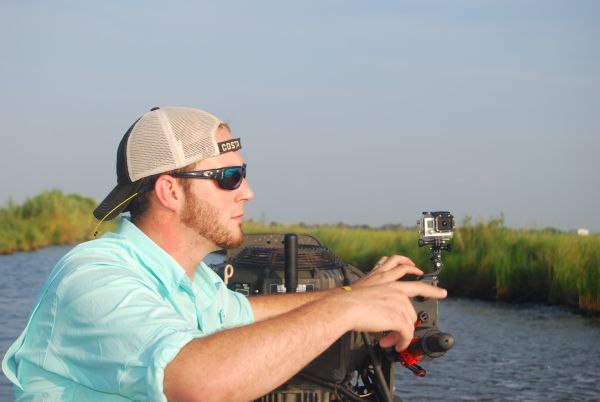
Thick grass that started covering many of the ponds earlier this year forced him to adjust tactics, as well.
“The fish’s head is down in the grass, and he can’t always see the bait,” Marcel said. “Sometimes I have to bounce it next to him or slide it up on the side of him.
“It just depends. For the Bayou Chub, you have to keep your pole high to avoid the grass.”
For love of the game
The respect and admiration he has for his prey is evident in the excitement he shows for each and every tail and fin he sees roiling the surface, and the delight he takes in hooking up on a big red and showing it to the camera.
“I don’t know if it’s being on the water and seeing the redfish’s tail, or seeing that big wake or seeing that explosion from a distance,” he said. “I get the same feeling when that big buck or doe comes out. I guess it’s red fever or the red plague; it overwhelms me.”
His knowledge of the marsh’s many twists and turns come from years of experience, and are key to his stellar track record of meeting the challenges: Out of six designated trips to date, he’s only returned without a limit once — and that trip included a popped line.
“I’ve been fishing here so long,” Marcel said. “I learned the terrain. I learned where the fish school. I watch the tide and I learned where the flats are, where the shallow water areas are.”
The clock is ticking
Between catches, he regularly checks his iPhone to keep track of the clock to make sure he stays on schedule for work.
Everything is carefully planned and timed out: Depending on his exact location in the marsh, he allows three to five minutes to return to the landing, plus another three minutes to put the boat back on the trailer.

And he knows he can make it from the landing to his office in Houma in about 18 minutes.
“Sometimes I change my clothes in the truck,” he said. “I put on my blue jeans, Polo shirt and my steel-toed boots, and I’m ready for work.”
On this hot day in late July, he came up one redfish short, but he didn’t make any excuses.
“The weather was great and the fish were there,” Marcel said. “They just didn’t want what we had today. We tried cocahoes, topwater and the gold spoon.
“That’s why it’s called fishing.”
So he headed off to work, knowing that he’d socked away some valuable weekend time that can be spent with his family: wife Kayla, 18-month-old son Fisher and 2-month-old daughter Laken.
“They asked me at work if I was going to have a duck-hunting challenge, too,” he said with a chuckle. “But I think that’s a little bit different.”
